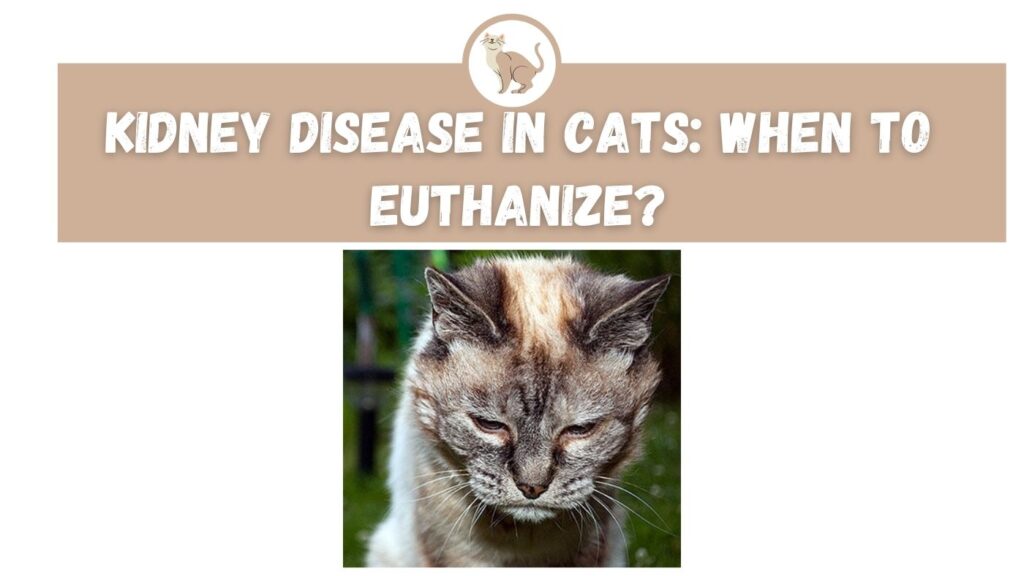Cats’ kidneys are a very vital organ of their body. Cats of any age can develop chronic kidney failure but it is usually more common in senior cats. Kidneys usually slowly lose function over a period of a couple months to a year.
Kidney problems often occur so gradually that by the time the symptoms become obvious in cats, it is already too late to treat the disease effectively.
When to euthanize a cat with kidney disease?
You should euthanize a cat with kidney disease once they continually show the following symptoms:
- Mental confusion
- Sudden weight loss
- Lethargy and loss of energy
- Dull and sunken eyes or blindness
- Refusal to eat
- Difficulty in breathing
Remember that all cats are individuals. You and your vet are the best judges of your cat’s quality of life. Try to make the decision based primarily on behavior, bloodwork results, and the physical condition of the cat.
Best cat food for cats with kidney disease
If you conclude that your cat still has a good enough quality of life, it is important that you still feed him/her specific food to help them combat their kidney disease. The best food for cats with kidney disease is Hill’s Kidney Care Food.

If your cat is underweight, you should check out my article on how to help a cat with kidney disease gain weight.
If your cat is strugglign with fleas, you should read my guide on the best flea treatment for cats with kidney disease.
What Do Your Cat’s Kidneys Do?
When blood flows through your cat’s kidneys, they filter out waste products generated from the breakdown of food, old cells, toxins, metabolic byproducts, and many drugs. They also trap good substances, like protein, back in the body. Your cat’s kidneys have many essential functions including:
- Remove waste material from the bloodstream
- Help regulate blood pressure
- Regulate levels of certain essential minerals such as potassium and sodium
- Produce a variety of hormones
- Regulate the amount of water in the blood and produce urine
- Stimulate red blood cell formation
- Help regulate calcium and vitamin D levels
Causes of Kidney Disease
There are many different causes of kidney disease in cats and some of them are not very obvious. The most common causes of kidney disease in cats are:
- Genetic or at birth malformation of the kidneys
- Chronic bacterial infection of the kidneys
- High blood pressure
- Urinary crystals and blockage
- Certain drugs
Symptoms of Kidney Disease in Cats
The obvious symptoms appear when the disease is at an advanced stage. The most common symptoms of chronic kidney disease in cats are:
- Vomiting
- White gums
- Lethargy
- Diarrhea or constipation
- Lack of appetite
- Gradual but consistent weight loss
- Depression
- Increased thirst and urination
- Acute blindness
- Seizures or coma
Less common symptoms include:
- Weakened bones
- Bruising of skin
- Itchy skin due to calcium and phosphorus deposition in the skin
- Bleeding in the gut or stomach
Diagnosing Kidney Disease in Cats
The primary indicator of kidney disease in cats is dilute urine. The vet needs to take some blood and urine tests including a chemical blood profile and a complete blood picture. Cats with kidney disease may have abnormal electrolyte levels, anemia, elevated blood pressure, and abnormally high levels of blood creatinine and blood urea nitrogen (BUN).
Other tests may include X-rays and ultrasounds to check the size and shape of the kidneys. The severity of kidney disease can be estimated based on blood waste product elevations. It is also measured by abnormalities in urine like the presence of protein in the urine. Sometimes, a kidney biopsy is required to identify the cause of kidney disease in cats.
Kidney Disease Staging in Cats
The stages are numbered 1 through 4 where 1 is the least severe and 4 is the most severe stage. When the stage number is higher, a greater number of symptoms can be observed in your cat.
Treatment of Kidney Disease in Cats
Kidney disease in cats is not a disorder that can be cured but it can be managed through supportive treatments. Fluid therapy is the cornerstone of treatment primarily to prevent dehydration. Your cat should have access to fresh and clean water at all times. Potassium is often added to the diet or fluid to safeguard against muscle weakness.
You should observe how much food and water is consumed by your cat. Also, try to weigh your cat weekly to make sure it is getting enough calories to maintain its body weight. Some vets also recommend an organic food diet for a cat suffering from kidney disease. I also suggest you feed your kitty a high moisture diet that is low in protein and phosphorus. It is important that you still try to help a cat with kidney disease gain weight.
Our final takeaway
If your cat is showing any symptoms of kidney disease, seek treatment to ensure the issue does not become severe. Vet annual examinations are a key part of preventive care.
The painful end of a cat’s life is very tragic and emotional. It’s always hard to say goodbye to the feline member of your family. Making the right choices will help you to avoid guilt and regret.
You can help your beloved cat live its best life! A healthy kitty can save you from a lot of stress in the long run. If you are not sure what is good for your feline pal check out more of our how to articles.

